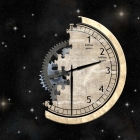The Kepler Cluster Study: Planets and Gyrochronology
Abstract:
The precise time-domain observations from NASA's Kepler
mission have lead to a breakthrough in the search for exoplanets in star
clusters and have begun a new era in the study of stellar
rotation. The Kepler Cluster Study (KeCS) was implemented as part of
the Kepler mission to search for transiting exoplanets in open star
clusters and to study the dependencies of stellar rotation on the most
fundamental stellar properties - age and mass. In this talk I will
motivate the two primary goals of KeCS, present our latest results, and
discuss some of their implications for our understanding of the formation
and evolution of planetary systems in star clusters, the angular momentum
evolution of Sun-like stars, and for developing a new technique to determine
stellar ages - gyrochronology.

